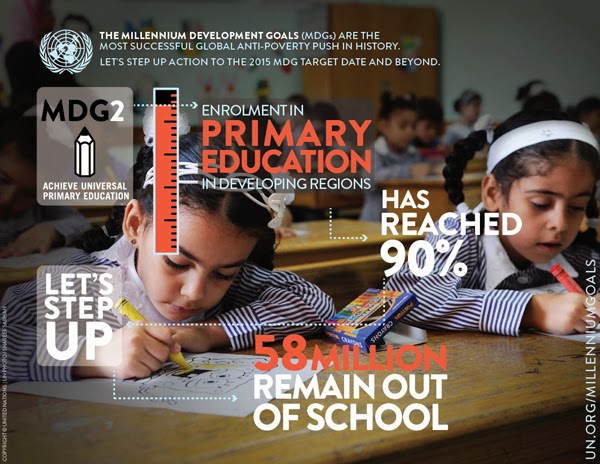The MDGs were set out in the year 2000 (hence the name) at a meeting of world leaders, organised by the United Nations. The leaders committed to the United Nations Millennium Declaration which has become known as the Millennium Development Goals. It was agreed that the countries would work towards completing the targets which saw an end to extreme poverty by 2015.
So what are these goals? Here's a nice little infographic that sets out the eight main targets.
As we enter the new year the question is, did they do it? Did they reach the targets and end extreme poverty across the world?
The answer, unfortunately, is no.
We've all heard stories and seen adverts on TV about the plight of some people across the world, where everyday is a fight for survival. I've seen it with my own eyes.
However some things have changed, and improved, and are on their way to being completed. Looking at the first goal, to eradicate extreme hunger and poverty, the UN claims that the extreme poverty rates have been cut in half! That's brilliant news don't get me wrong, but that still leaves the other half living on less than $1.25 a day. That's 1.2 billion people. For those of you who are used to British money, that's 81 pence. What can you buy for 81p? Globally, 1 in every 9 people do not have enough food. After a Christmas season of indulgence, it's hard to imagine what it would be like to not know where your next meal is coming from.
This is one of the most important goals. Without food, people cannot function. It's a basic human need and it's ridiculous that in 2015, there are still people around the world who do not have enough to eat.
Goal two focuses on primary education. The aim is that every single child around the world, both girls and boys, should complete their primary school education. The levels of school enrollment are rising, but there is still a big problem facing girls in the developing world (as I spoke about in this blog). In many third world countries, schools require fees which means lots of children miss out on education because their families cannot afford to send them. In Uganda, we worked with lots of children who had never been to school but were so eager to learn.
Education is important as it leads to so many opportunities. We hope that once completing primary school, children will go on to secondary education, where their gifts and talents can be discovered and ambitions can be created. Being illiterate is life limiting, and by ensuring that everyone can read and write there is a ripple effect. Health improves, the economy grows, equality increases. Everyone is better off.
The third MDG is to promote gender equality and empower women. This is an issue particularly close to my heart and I am a strong believer in the empowerment of women. The UN claims that gender equality has been achieved in primary education, which means that the same number of girls attend school as boys. Even if this is true, women and girls still face discrimination in many other areas of life. In the workplace, in politics, in law. Women are still paid less than men for the same work (even in the UK). I'm glad that this is one of the goals, but we certainly have a lot more progress to make!
Here's an update on the rest of the MDGs. If I get some time - I'll write a bit more about each one!









